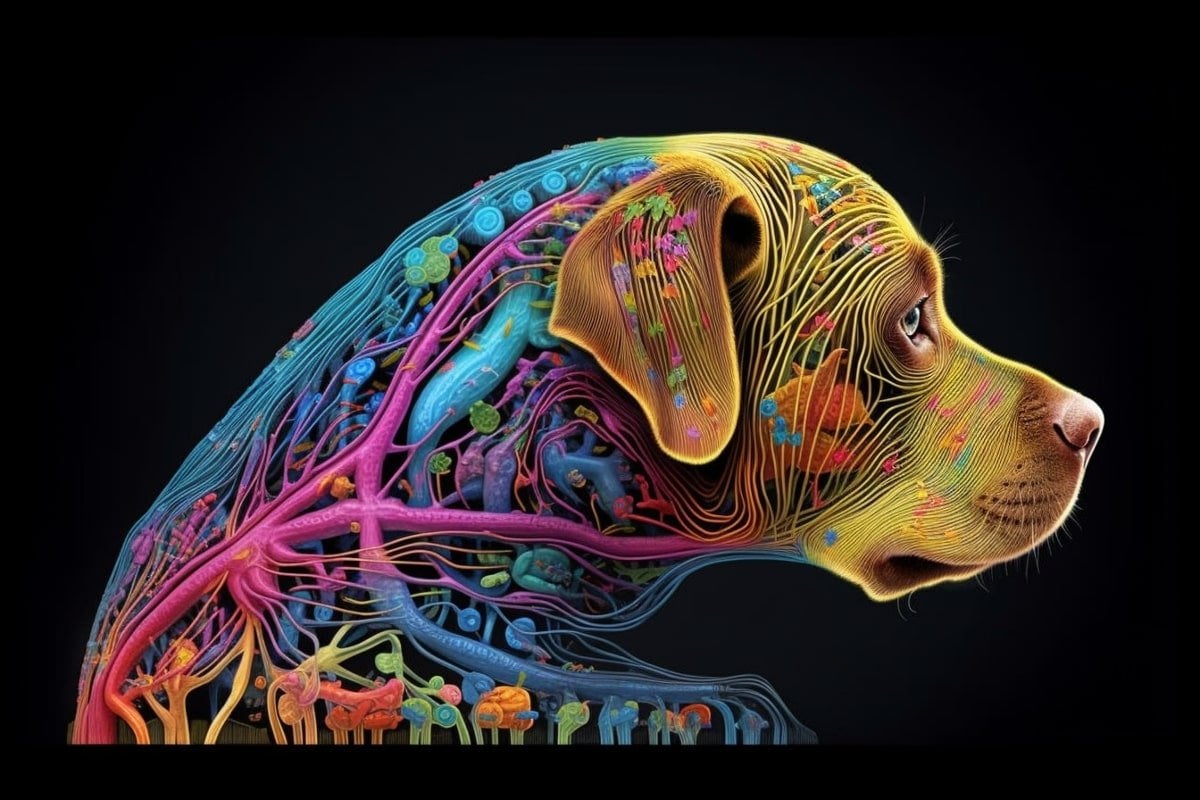Decoding Canine Lineage: The Evolutionary Journey of Dogs
Dogs, man's best friend, share a profound evolutionary connection with ancient wolves. Their journey from wolf to domesticated companion is intriguing, shaped by human interaction, geographic migration, and dedicated breeding practices.

If you are like us then you have often pondered the relationship you have with your dog, and the more curious among you will have wondered how a wild wolf ever became the dog you love and trust. If that sounds like you dear reader, you are in luck! This discussion here isn't about the immediate parents of your dog, but something much deeper, entering the realm of dog evolution.
Dog evolution sparks as much debate and curiosity as human evolution. The question at the core of this debate: Where did dogs originate? Did dogs evolve from another creature or were they divinely created and sent to Earth to be our devoted companions? Though opinions vary greatly, research has managed to shed some light on these questions, enabling a consensus to emerge.
An area of general consensus among researchers is that the ancient wolves are the direct ancestors of our modern dogs, but how did this evolution from wolves to dogs happen? The story begins long ago, with wolves venturing closer to human settlements, scavenging leftover food from human hunters. Over time, these wolves developed a friendly disposition towards humans, and their offspring grew even more comfortable around human beings. This process eventually led to the evolution of wolves into the dogs we know today.
My favorite movie which tells the story of a developing pre-historic relationship between man and dog is Alpha, a movie about a young man during the ice age struggling to return home after being separated from his tribe during a buffalo hunt. He finds a similarly lost wolf companion and starts a friendship that would change humanity, it is a wonderful movie, and credible in its theorizing.
The history of domestication itself is a bone of contention among scientists. Canis familiaris or Canis lupus familiaris, also known as the domestic dog, has historically earned the title of humans' best friend. However, the timeline of the first domesticated dog remains disputed. Some researchers suggest the first domestic dog appeared about 15,000 years ago, while others believe it to be around 30,000 years ago. Recent studies have shown that the Basenji breed can trace its lineage back to 30,000 years ago in central Africa. Even today, these barkless dogs live and hunt alongside local tribespeople in the African Congo.
In October 2020, a breakthrough study provided new insights into dog evolution by analyzing the genomes of 27 ancient dogs and wolves. This study, the most comprehensive to date, concluded that:
- By 11,000 years ago, dogs had already separated into five distinct lineages, spreading globally.
- While it's commonly accepted that domestication began at least 15,000 years ago, this study suggests that it could have started as early as 20,000 years ago.
- Modern dogs do not exhibit the same genetic diversity that ancient dogs once did.
- No new wolf DNA has entered dog genomes since their evolution from wolves more than 15,000 years ago.
The question of where domesticated dogs first originated is still a contentious issue, with theories ranging from Africa to East Asia, Europe, Mongolia, and Siberia. The 2020 study found that ancient dogs in Africa were descended from dogs in the Middle East and that dogs' geographic spread did not always align with human migration patterns. The complex nature of dog DNA and the lack of concrete evidence make it difficult to pinpoint the exact regional origin of dogs, leaving more questions than answers.
The correlation between the domestication of dogs and rabies is also an important consideration, because rabies has had a significant influence on the canine-human relationship, especially in the context of domestication. There are approximately 900 million dogs worldwide, with many living as wild or homeless creatures. More than 59,000 people per year die from rabies, largely due to dog bites, especially from dogs that haven't received vaccinations.
Wild canines, which were the primary carriers of the disease, posed a significant threat to early human settlements. However, as humans began to domesticate dogs, these animals gradually became a buffer, protecting humans from the disease by forming a barrier against infected wild animals. This role of dogs as protectors not only elevated their status in human societies but also provided an evolutionary advantage to domesticated dogs over their wild counterparts.
The domestication of dogs, coupled with the advent of rabies vaccinations, has significantly reduced the incidence of this fatal disease in humans. The process of domestication has meant dogs are less likely to roam freely and come into contact with infected wild animals, decreasing the spread of the disease. Regular vaccination of domesticated dogs has been a game-changer in combating rabies, reinforcing the essential role of responsible pet ownership in public health. So, while the domestication of dogs has brought joy and companionship to humans, it has had far-reaching implications for our collective health and survival.
The practice of breeding has had a significant impact on dog evolution, particularly regarding their appearance and health, and breeding has led to dramatic changes in various dog breeds over the past century. While debates continue over the origins and evolutionary journey of dogs, modern technology can offer us a glimpse into your dog's unique genetic makeup, dog DNA tests can reveal your dog's breed breakdown, potential relatives, possible health risks, and more, providing a personal journey into the history of your faithful companion.
As we continue to unravel the complex history of canine evolution it's evident that our companionship with these animals is not a recent phenomenon but one that spans tens of thousands of years. It's fascinating to think about how a mutually beneficial relationship between humans and wolves could lead to the diverse assortment of breeds we have today. We find ourselves immersed in a captivating tale that's part history, part science, and entirely compelling.
Despite conflicting theories and ongoing debates, one thing remains certain: our connection with dogs is deep-rooted and complex, mirroring our shared journey through time and evolution over the last few tens of thousands of years.
As I said, dogs have historically earned their place in our society the hard way, and it is because of that we love them and call them our best friend.


